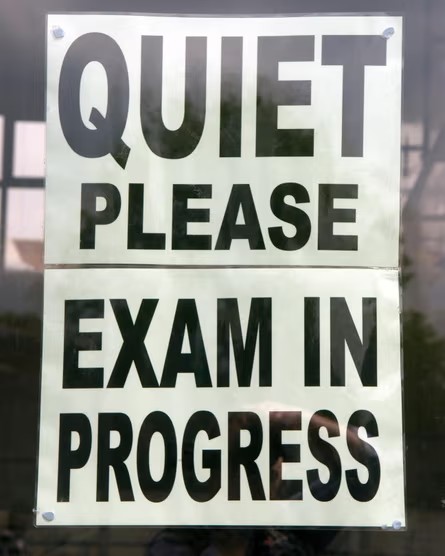If you wish to add articles of interest to this site or see a forum, please contact me via my e-mail address. I will 'eventually' reply to all posts. All submitted articles will be author acknowledged unless otherwise requested.
Copyright © 2026 by Nigel G Wilcox
All Rights reserved
E-Mail: ngwilcox100@gmail.com
Web Title: paragon.myvnc.com
2026
Designed by GOEMO.de
Powered by S-AM3L1A-NGW
NW Education, Training & Development
Looking at Education today, one Perspective...
Parent Site: http://paragon.myvnc.com Paragon Publications UK
My Personal Introduction to Teaching from My Experiences
and the Reason for This Website with Opinions...
Education & Professional Development
Birmingham ICC 2001
2-3
2-3
Pages
Left-Wing Education?
It’s become more important that you absolutely hit your grades.’ Photograph: Paul Doyle/Alamy
Extra exam time: why do so many schoolkids suddenly need it?
The balance has tipped so the minority of students sit in the big hall.’ Photograph: Posed by models. monkeybusinessimages/Getty Images

Pepe di’Iasio was a headteacher before becoming general secretary of the Association of School and College Leaders. “You probably sat your exams in a hall in a school, with 100 people sitting on desks in rows, and that still exists,” he says to me. “But when the balance tips, so actually it’s the minority of students in the hall and the majority of students in special conditions for one reason or another, be it special educational needs or a social or emotional reason, or a mental health diagnosis that means they can’t perform in the main hall, you’ve got a serious logistical problem.
“Not only do you need to be able to house them, you then need an exam invigilator so you can hold exams safely, securely and appropriately. Then there’s the arrangements around the printing of exams in different ways, shapes or forms, which needs to be done within a certain time frame.”
Some students may need papers printed in A3; others require a different-coloured paper to aid vision. “The logistics of checking the right person has the right paper in the right colour, in the right size, in the right venue, and multiply that by 1,000 … to see it happening on the morning of an exam is bewildering. It’s awesome to see how schools deal with it,” says Di’Iasio.
Jane Wright, a special educational needs co-ordinator (Senco) at Hornsey School for Girls, a state secondary in north London, is familiar with the challenges. “We have about 50 students with various access arrangements, ranging from supervised rest breaks to extra time, bilingual dictionaries, readers, computer readers and word processors. In terms of resources we’re having to buy more computers, computer reader software and get staff to be able to invigilate in those rooms as well.”
While we continue to rely on high-stakes assessment where everything depends on an end-of-course exam, Wright thinks special arrangements will have to remain in place for students who would otherwise be at a disadvantage. She wonders if there might be a better alternative. “If there were things such as coursework, how it used to be, then maybe you would get a better picture and wouldn’t need to put so many things in place.”
Sandra Leaton Gray, professor of education futures at UCL’s Institute of Education, says there are two main issues driving the increase in special access arrangements. “The first is that there aren’t as many opportunities to do things such as resits and it’s become higher stakes. So it’s become more important that you absolutely hit your grades a lot of the time.”
The second problem is the challenge of getting children with special educational needs and disability (Send) diagnosed and supported appropriately. Without that, “it tends to come down to things such as extra time and use of laptops, because it’s an easy, cheap accommodation for what is quite a complicated problem”.
Later down the line, there is also the possibility of post-assessment adjustments to the marks of candidates who have not been able to demonstrate attainment because of exceptional circumstances, such as illness, bereavement or “domestic crisis”, which is known as “special consideration”. As with access arrangements, there has been a steady increase in these requests, which rose to almost 725,000 in England last year, up 3% on 2023, of which 95% were approved (in 2023, requests were up 19% from the previous year). Ofqual said it did not have figures on how these requests break down by school type.
As for the stark differences between private and state schools, “I think private schools are definitely more attentive with regard to completing supporting paperwork to maximise chances for everything they can,” says Leaton Gray. “They have a great deal of skin in the game, because if they don’t deliver on results they go out of business spectacularly, in a way that state schools generally don’t.”
Lindsey Hughes, headteacher of Channing, a private school for girls in north London, says around a third of her pupils taking GCSE and A-level exams this year have access arrangements. Some have two or more. Extra time, supervised rest breaks and word processors are the most common adjustments.
She denies any suggestion that private schools are gaming the system and says the discrepancy between access arrangements in private and state schools is more likely to be down to funding for Send and class sizes in the state sector: “In my view what you’re seeing in independent schools is how the system ought to work, because every pupil deserves the chance to have their needs taken into account when they go into the exams. Unfortunately the size and scale of the funding problem in the state sector just means it doesn’t happen.”
The Independent Schools Council agrees. “There is a considerable burden of proof needed for exam access requirements,” an ISC spokesperson says. “Students from independent schools who need such support are meeting this, and schools are working within the system as it currently stands. Independent schools may have more resources to identify and support young people who may need extra consideration in their exams, and there has been a rise in such need post-Covid.”
Ofqual is investigating after education secretary Bridget Phillipson, no less, raised concerns. A spokesperson said: “We are looking at changes in the data on access arrangements, including analysis by type of school or college. We will consider what the data shows and any implications for our regulatory approach. This involves complex work but we expect to see results from this analysis before the end of this year.”
Jill Duffy, chair of the Joint Council for Qualifications, which is responsible for the regulation of access arrangements across the UK, welcomed the investigation. “We do have a JCQ inspection service that will look at access arrangements in schools and how these are applied for. From those inspections we see very little evidence that there’s any gaming of the system going on.” But she adds: “Often it’s the exams and the exam systems that throw up some of the inequalities, and the unfairness that’s in the education system more broadly.
Continued>>>








